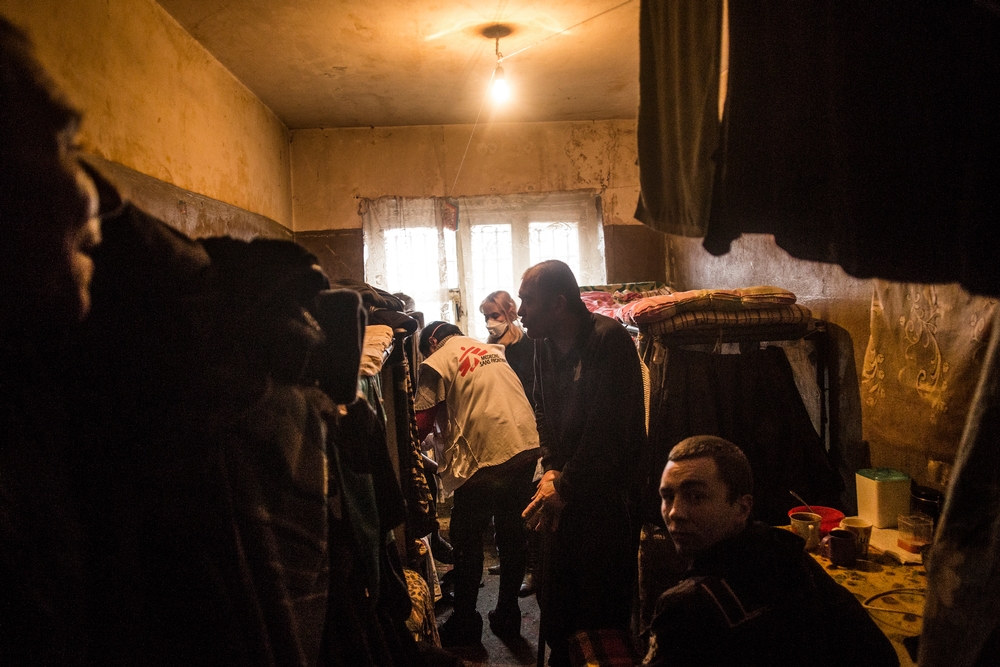Médecins Sans Frontières/Doctors Without Borders (MSF) is shocked and strongly refutes false allegations made in the media by the Humanitarian Committee of DPR regarding our medical-humanitarian activities, including erroneous statements regarding mismanagement of pharmaceutical products, criticism of our mental health program, and unfounded accusations of espionage.
For the last 18 months, we have been working hard to provide free, life-saving medical care to people affected by the conflict on both sides of the front line. All MSF activities, including the transportation, storage and distribution of medicines as well as mental health activities have at all times been carried out in cooperation and coordinated with the authorities in DPR.
Thousands deprived of medical assistance
While we received official notification of the withdrawal of our accreditation to work in DPR on 19 October, at no time has the organisation been given formal clarification of the reasons behind the decision to halt activities.
We are extremely concerned by the decision to cancel our accreditation and the order to cease medical activities, which will deprive thousands of people of life-saving medical assistance.
In order that life-saving medical care can continue to be provided to the population, we remain willing to collaborate with the authorities, and continues to call for an urgent review of the decision to halt our activities.

Mental healthcare vital to assist suffering
The provision of psychological care is a key component of our activities in many conflict zones. We were running a mental health program in DPR until July 2015, when we were asked to stop by the Humanitarian Committee.
MSF strongly disagreed with this decision as mental health counselling is a crucial part of medical activities to help people deal with the consequences of conflict.
Before this, our teams had been counselling people about emotional reactions following traumatic events, and teaching them practical tools to help cope with fear, anxiety, and nightmares.
In addition, psychologists were training local medical and mental health staff to improve their skills and avoid burnout.
In DPR, we conducted more than 3,400 mental health sessions, including individual counselling, group counselling sessions and training in more than 35 locations.
Crucial psychotropic drugs
In line with medical protocols, psychotropic medications are an essential component of medical kits provided to health facilities where doctors treat war-wounded, patients with chronic conditions such as epilepsy, and people with mental illnesses.
Each medical kit contains all the necessary supplies to appropriately treat patients and are distributed based on requests of the health facilities.
The psychotropic medications were donated to the public health system in order that patients could receive them from their regular doctor.
All donations of medicines and medical supplies are coordinated with, and reported to, the health authorities.

Treating war-wounded and chronic diseases
Since the beginning of the conflict in May 2014, we have donated medication and material to 170 medical facilities to treat war-wounded and patients with chronic diseases.
We have also conducted more than 85,000 consultations together with local healthcare authorities through 40 mobile clinics since March 2015, providing healthcare to people living in places from where doctors and nurses have fled or where pharmacies are empty.
Consequences of conflict
We are almost the only organisation providing treatment for tuberculosis in prisons, insulin for diabetic patients and haemodialysis products to treat kidney failure. With the termination of activities from one day to the next, thousands of patients suffering from chronic potentially fatal diseases will be now left with little or no assistance.
We currently providing 77 percent of the insulin needed for patients aged over 18 with diabetes in the area under DPR control.

Very few back-up options
Teams also supply 90 percent of the products necessary to conduct haemodialysis treatment, vital for patients suffering from kidney failure. Without the steady supply of these life-saving treatments, severe health complications can occur.
There are very few back-up options for these people now that we have stopped our activities.
Some 150 patients in the penitentiary system who live with drug-resistant tuberculosis will now no longer have access to the treatment that we have been providing since 2011. There is a huge risk that the health of these patients will deteriorate soon.
Any interruption of treatment of patients with drug resistant TB is known to reduce dramatically the prospects of cure, even if they restart treatment later.





